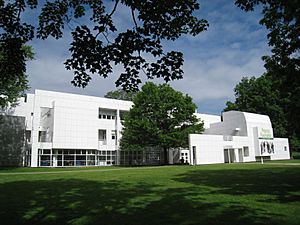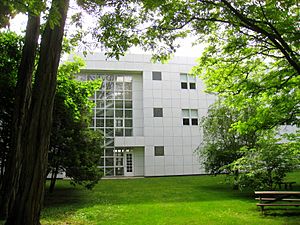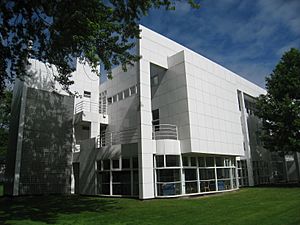Hartford International University for Religion and Peace facts for kids
The Hartford International University for Religion and Peace is a private university in Hartford, Connecticut. It helps people learn about different religions and work for peace. It used to be called Hartford Seminary.
 |
|
|
Former names
|
Hartford Theological Seminary Hartford Seminary Foundation Hartford Seminary |
|---|---|
| Type | Private theological university |
| Established | 1833 |
|
Religious affiliation
|
Non-denominational |
| Endowment | $47.9 million (2019) |
| President | Joel N. Lohr |
|
Total staff
|
21 |
| Students | 92 |
| Location |
,
,
United States
41°46′12″N 72°42′27″W / 41.7699°N 72.7076°W |
| Campus | 35 acres (14 ha) |
Contents
History of the University
The university started a long time ago, in 1833. It was first called the Pastoral Union of Connecticut. Its goal was to train ministers for churches. The next year, it became the Theological Institute of Connecticut.
In 1865, the school moved to Hartford, Connecticut. In 1885, it officially became the Hartford Theological Seminary. Over the years, other schools joined it. These included the Bible Normal College and the Kennedy School of Missions.
By 1961, all these parts officially merged. They took on a new name, the Hartford Seminary Foundation. This name was used until 1981. Then, it became simply "Hartford Seminary."
In 1972, the seminary began to offer special programs. These programs focused on talking and understanding between Christians and Muslims. By 1990, it became a non-denominational school. This means it was not tied to one specific religious group.
On January 1, 2018, Hartford Seminary joined a large group of religious schools. This group is called the Boston Theological Interreligious Consortium (BTI).
In October 2021, the school changed its name again. It became the Hartford International University for Religion and Peace. This new name shows its main focus. It wants to help people from different religions understand each other and work for peace.
University Campus
When the seminary first moved to Hartford in 1865, it was in a different spot. Later, in the 1910s, plans were made for a new campus. This new campus was built in the 1920s. It had beautiful buildings in a style called Collegiate Gothic Revival.
The seminary used these buildings until 1981. Today, these old buildings are part of the University of Connecticut School of Law. The main building the university uses now was finished in 1981. It was designed by a famous architect named Richard Meier. The university also uses other nearby buildings that have always been part of its campus.
What Students Study
Hartford International University has two main study centers. One is the Hartford Institute for Religion Research. The other is the Duncan Black Macdonald Center. This center focuses on studying Islam and Christian-Muslim relations. It is the oldest center of its kind in the United States. It opened in 1973.
The university offers different types of programs. Students can earn certificates or advanced degrees. They can even get a doctoral degree. It also has the only approved program in the country for training Islamic chaplains.
The Muslim World Journal
Hartford International University has been home to an important academic journal since 1938. The journal is called The Muslim World. It started in 1911. It publishes research about Islam and Muslim societies. It also covers how Christians and Muslims have interacted throughout history and today. The journal is published four times a year.
Notable Alumni
Many interesting people have studied at this university. Here are a few:
- Akaiko Akana, the first Hawaiian pastor at Kawaiahaʻo Church.
- Fred Hovey Allen, a clergyman and author.
- Thomas L. Angell, a scholar at Bates College.
- Frank Buchman, who started a group called Moral Re-Armament.
- Dosia Carlson, a minister and hymn writer.
- Asnage Castelly, a wrestler who competed for Haiti in the 2016 Summer Olympics.
- Henry Allan Gleason Jr., a linguist.
- Yvonne Y. Haddad, a professor at Georgetown University.
- Yahya Hendi, a Muslim chaplain at Georgetown University.
- Fenwicke Holmes, a religious leader.
- Fred Kirschenmann, a leader in farming that helps the environment.
- Charles H. Kraft, a missionary and linguist.
- Vergel L. Lattimore, a professor.
- Rachel Taylor Milton, who helped start the Urban League of Greater Hartford.
- Richard T. Nolan, a writer and professor.
- Beverly Daniel Tatum, a former President of Spelman College.
- Walt Wolfram, a professor who studies language.
- Andrew Young, a pastor, former mayor of Atlanta, and UN ambassador.
- Alexander Marthoma Valiya Metropolitan, a religious leader.
Images for kids
 | Precious Adams |
 | Lauren Anderson |
 | Janet Collins |




